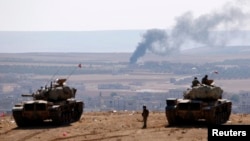Turkey has a front row view of the advance of Islamic State militants, with Turkish tanks within striking distance of IS fighters battling for the Syrian border town of Kobani. Yet even as the United States and other Western allies press Ankara to join the anti-IS coalition, and Turkish Kurds take to the streets demanding a defense of Kobani, Turkey is holding back.
Parliament last week approved Turkish military involvement in Syria and Iraq, and Prime Minister Ahmet Davutoglu was quoted by Turkish media as vowing not to let Kobani fall. Coalition airstrikes have hit IS targets around the town, also known as Ayn al-Arab, but military analysts say ground troops would be needed to prop up Kobani's outgunned defenders.
Those defenders, say observers, offer insight into Ankara's reluctance to engage. Now fighting street-by-street battles with IS are forces aligned with the Kurdistan Workers Party, or PKK, a group both Turkey and the United States call a terrorist organization.
Anti-IS or anti-Kurd?
This raises the question of what Turkey's parliament was intending when authorizing military incursions. "The resolution says it is to fight against terrorist groups, but it doesn't even mention [the Islamic State]," Blaise Misztal of the Bipartisan Policy Center told VOA's Turkish service. "In fact, the only group it mentions explicitly is the PKK."
The wording, the inaction, and a warning by jailed-PKK leader Abdullah Ocalan that fragile peace talks between the government and his group will fail if Kobani falls, has brought mass protests by Turkey's Kurdish minority. At least 16 people have died in recent days. Several Kurdish areas are under curfew.
Many suspect some politicians are happy to have Turkey's troops sit on the border watching two enemies wipe each other out. Though it was later scrubbed, a tweet by former deputy prime minister Emrullah Isler suggesting he preferred IS over the PKK gave some credence to those suspicions.
Ankara wants coordination
The Turkish government has made clear there must be a coordinated international response to the situation. The U.S., however, is still vetting the "moderate opposition" that would eventually play a ground combat role against IS in Syria.
"Turkey will remain extremely reluctant to play a unilateral military role in terms of putting Turkish boots on the ground," Omer Taspinar of the Brookings Institution told VOA's Turkish Service. "I think Turkey's support for the coalition will remain at logistical and counterintelligence level."
But not for want of trying for more. U.S. President Barack Obama has called his Turkish counterpart, Recep Tayyip Erdogan, asking for support. NATO and U.S. military leaders will visit Ankara later this week.
Analyst Misztal says it is part of an aggressive strategy. "I think part of it was basically shaming, saying ' ... if Turkey wants to be the sort of regional leader that it says it wants to be, then it really needs to step up and be involved. And if it's the NATO ally and close partner of the United States that it says it is, then it really needs to help us with this," said Misztal.
So urgent is the matter that U.S. Vice President Joe Biden had to apologize for saying last week that IS fighters used Turkey as a transit point because Ankara failed to secure its borders - a point of fact few but the Turkish government argue.
The Assad problem
Perhaps the bigger problem is who the U.S.-led coalition and the Turkish government view as the true enemy. What Ankara wants from Washington, said Brookings' Taspinar, "is a stronger commitment and a clear strategy in terms of addressing the root cause of what Turkey sees as the problem in Syria. And the root cause of the problem is of course the Bashar Assad regime."
Even supporters of the coalition mission are concerned airstrikes will ease the pressure on Syrian President Assad, whose government has lost considerable territory to the Islamic State. U.S. officials have deflected those concerns, arguing the urgency of IS advances mean it must be the prime target.
Despite its anti-Assad policy, the U.S. has lost credibility among many in the region over its past reluctance to arm any in the Syrian opposition, as well as reversing its decision to strike Syrian government positions after allegations Damascus used chemical weapons against its own people.
Since beginning its strikes against IS in Syria, U.S. officials have deflected concerns about helping Assad, arguing IS advances must be the priority.
The Bipartisan Policy Center's Misztal called such divergent views "the biggest sticking point between the U.S. and Turkey going forward."
Dorian Jones contributed to this report from Istanbul.




